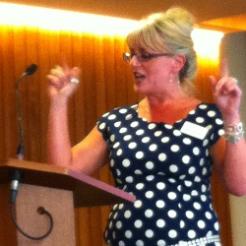A panel debate yesterday about public service delivery quickly became dominated by impassioned exchanges between a certain Debra Allcock Tyler and a senior manager from G4S. Tania Mason was there to hear them.
It's not often Debra Allcock Tyler is defeated by anything, but she was unable to convince a charity audience yesterday to vote in favour of her argument that public services are best delivered by the voluntary sector.
The Directory of Social Change's ebullient chief executive was taking part in a panel debate on the motion ‘This house believes that public services are best delivered by charities’. She was at her barnstorming best, elucidating at a rate of nineteen hundred to the dozen, gesticulating, finger-wagging, eyes a-blazing. Her argument, in a nutshell, was that the voluntary sector delivers better services because it cares more than the private sector. Private companies won't stick around if there's no profit to be made, she said, and nor should they – that’s not their job. But charities will never walk away from a need because it is uneconomical to stay - they'll find another way to meet it.
Public services are 'not just a transaction'
She contended that the issue at the heart of the debate was misguided - it implied that public service delivery is merely confined to a transaction that plugs a short-term gap, when it should be about effecting a transformation that lasts well into the future. She used an example of a disused canal that the local authority wanted to clean up and regenerate: one option is to issue a tender, award it to the best private sector bidder - "let’s call them ABBS.co.uk - A Bunch of Blokes with Shovels" - and then have to reissue the tender again in three years when the canal has fallen back into rack and ruin.
The second, much more sustainable option, she suggested, is to give a grant to the “Clean Up the Canal Campaign” to enable it to buy some shovels and pay a volunteer manager to engage local people to come and clean it up. “These volunteers will go and nobble their neighbours and their mates and local businesses to come and engage in this canal, and care about it and make it a place people want to come to,” she said. "It’s not just the transaction of cleaning up the canalside - the real challenge is to engage a community to take responsibility for its environment. That’s a lot harder work in the short-term but that’s what makes it sustainable.”
At the end of the day, Allcock Tyler said, the for-profit model is too risky for most social and environmental problems. “We need sustainability,” she concluded, “and that is not about income, it’s about commitment. Businesses are fundamentally motivated by the need to make a profit, not out of a sense of duty or a desire to help the needy. And the minute it is not profitable, they will walk away.”
Yet she didn’t blame companies for this; after all, it’s what they’re set up to do, and society needs them to be profitable. No, the fault lay firmly with government, she said, for introducing competition in service delivery. “If you introduce competition,” she warned, “what you get is horsemeat.”
The brave man from G4S
Arguing just as articulately against the motion was a man from G4S – possibly the bravest person ever to face a charity sector audience. Sean Williams, managing director of G4S employment support services, described himself as “sector-agnostic”. He said he could not disagree that charities deliver some excellent services, but to say they are “best” at providing them was “demonstrably and empirically false”.
He used G4S’s experience of the Work Programme to support this argument: the 26 private, public and voluntary sector organisations that are subcontracted to G4S have helped nearly 30,000 long-term unemployed people find jobs – but the performance data collected has proved that charitable providers have been no better or worse at it than their commercial counterparts.
Innovative, flexible, well-managed services can be provided by any type of organisation, Williams said. What is important is ethics, vision and leadership – and those qualities can be found in any sector. Charity employees have no monopoly on morality just because they work for charities – just as those employed in the private sector are not automatically selfish, money-grabbing, evil people.
'Some of the most self-aggrandising people work for charities'
Debra agreed wholeheartedly with this, and got the biggest cheer of the day when she chipped in: “I agree with you, Sean – we don’t have nicer people in the voluntary sector – in fact, some of the most self-aggrandising, selfish, backstabbing bastards I have ever met work for charities.”
But Stonewall’s CEO Ben Summerskill, sitting in the audience, had little sympathy with Williams and couldn’t help but remind him of the Olympics security debacle that G4S caused. “A tiny bit of humility wouldn’t go amiss,” he told him.
Unique ethos
The biggest danger the voluntary sector faces, Allcock Tyler cautioned, is that the distinction between the three sectors is lost, and the public service delivery arena becomes just “one big amorphous sector”. The voluntary sector must protect and preserve its unique ethos.
“The spirit of voluntary endeavour,” she said, with stateswomanlike aplomb, “is the flame around which we all gather, enabling us to understand and care for our fellow citizens.
“It’s not just about giving somebody a bowl of soup.”
Yet despite the obvious passion with which Debra delivered her argument, she could not convince more than a handful of the audience that the motion should be carried. Instead, a slightly revised motion put forward by St Giles Trust’s Rob Owen – “that this House believes that some public services are best delivered by some charities” – got universal acceptance.
The debate was organised by Russell-Cooke Solicitors and held at the Royal Festival Hall.










